Did you know some bird species can live over 60 years? That’s longer than many pets! Birds are great companions, offering loyalty, affection, and long-lasting friendships. From tiny finches to big parrots, many bird species can be wonderful pets.
Whether you’re new to bird ownership or have experience, knowing what birds need is key. This guide will help you understand different bird species as pets. We’ll cover their care needs and how to pick the perfect bird for you.
Key Takeaways
- Birds can make excellent long-term companions, with some species living over 60 years.
- The wide variety of pet bird species includes small finches, medium-sized parrots, and large macaws and cockatoos.
- Proper research and preparation are essential before bringing a pet bird into your home.
- Each bird species has unique care requirements, personalities, and lifespans that must be considered.
- Providing the appropriate environment, diet, and socialization is crucial for a bird’s health and happiness.
Understanding Pet Birds as Companions
Birds can be great companions, offering unique benefits. They are intelligent, beautiful, and can even talk or sing. But, caring for a bird is a big responsibility. They need special care and attention.
Benefits of Having Birds as Pets
Having a pet bird can be very rewarding. They love to interact with people and can even learn to talk. Their colorful feathers and graceful movements add beauty to any home.
Social Nature of Pet Birds
Birds are social animals and need lots of interaction. They can become very attached to their owners. It’s important to give them a fun and loving environment.
Commitment and Responsibility
Getting a pet bird is a big commitment. Many birds can live for a long time. Before getting a bird, you need to think about their needs and how long they will live.
“Birds are intelligent, engaging, and can make wonderful companions, but they require a significant level of commitment and specialized care.”
What Birds Can You Have as Pets?
The world of pet birds is full of different species, each with its own charm and needs. From small parakeets to big macaws, there’s a lot to choose from. Knowing what each pet bird species needs is key to a happy and rewarding relationship.
Parakeets, or budgies, are small and colorful. They weigh just 1 ounce and are 7 inches long. They can live for 7 to 15 years with the right care. Cockatiels are a bit bigger, weighing 2.5 to 4 ounces and growing up to 13 inches long. They can live for 10 to 15 years.
| Bird Species | Weight | Length | Life Expectancy |
|---|---|---|---|
| Parakeets (Budgies) | 1 ounce | 7 inches | 7 to 15 years |
| Cockatiels | 2.5 to 4 ounces | 12 to 13 inches | 10 to 15 years |
| Cockatoos | 10 to 30 ounces | 12 to 25 inches | 40 to 70 years |
| Lovebirds | 1.5 ounces | 5 to 6.5 inches | 5 to 15 years |
| Finches | 0.5 to 1 ounce | 4 inches | 15 to 20 years |
| Conures | 9 to 10 ounces | 13 inches | 20 to 30 years |
Cockatoos are at the other end of the spectrum. They can weigh 10 to 30 ounces and live up to 70 years. They need a lot of care and attention, making them best for experienced owners.
Whether you like parakeets, cockatiels, or cockatoos, there’s a bird for everyone. Understanding each bird’s needs helps you choose the right one. This way, you can give your feathered friend a happy and fulfilling home.
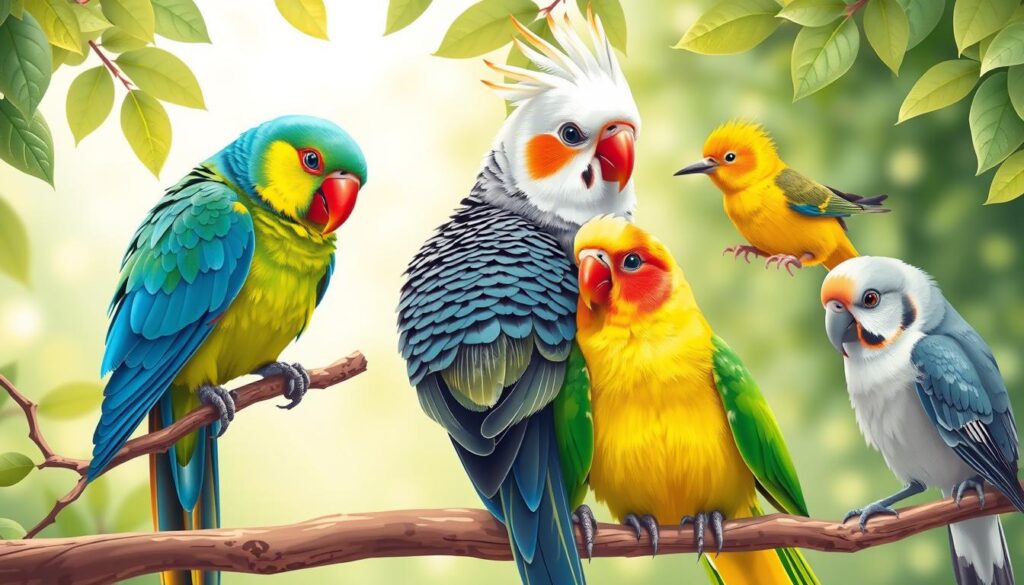
Popular Small Pet Birds for Beginners
There are many small pet birds that are great for beginners. Budgies (parakeets) and cockatiels are especially popular. They can add joy and beauty to your life.
Budgies (Parakeets)
Budgies, or parakeets, are loved by many. They are lively and easy to care for. They live for 7 to 15 years and are small, weighing about 1 ounce.
They are fun to watch and can learn tricks. They are perfect for beginners and those with little space.
Cockatiels
Cockatiels are also great for beginners. They are gentle and have a deep gaze. They can live up to 20 years and are about 3 ounces.
They are playful and love to interact. This makes them a wonderful choice for beginners.
Finches and Canaries
Finches and canaries are known for their beautiful songs. They live for 4 to 10 years. Finches and canaries are small, weighing less than 1 ounce.
They are perfect for seniors or families. They add a touch of nature to any home.
Choosing a bird as a pet is a big decision. You need to think about space, time, and your lifestyle. With the right care, these birds can bring joy for years.
Medium-Sized Birds for Experienced Owners
Medium-sized birds like conures, lovebirds, and pionus parrots are great for those with bird experience. They need more care and space than small birds but are easier than large ones. These birds are lively and can even learn to say a few words.
These birds are perfect for those who want a bird that’s fun and interactive. They are smart, playful, and social. This makes them great for owners who are ready to spend time and effort on their care.
Conures
Conures are known for being smart, curious, and fun-loving. They love to be around people and can be quite bold. But, they are loud and have strong beaks, so they need owners who can give them lots of attention and space.
Pionus Parrots
Pionus parrots, like the Maximilian’s and blue-headed parrots, are calm and gentle. They are less demanding than some birds and can be great pets for those who are dedicated to their care.
| Parrot Species | Percentage Suitable for Experienced Owners | Known for Talking Ability | Vibrant Colors |
|---|---|---|---|
| Conures | 100% | 34% | 63% |
| Pionus Parrots | 100% | 24% | 47% |
| African Grey Parrots | 100% | 72% | 11% |
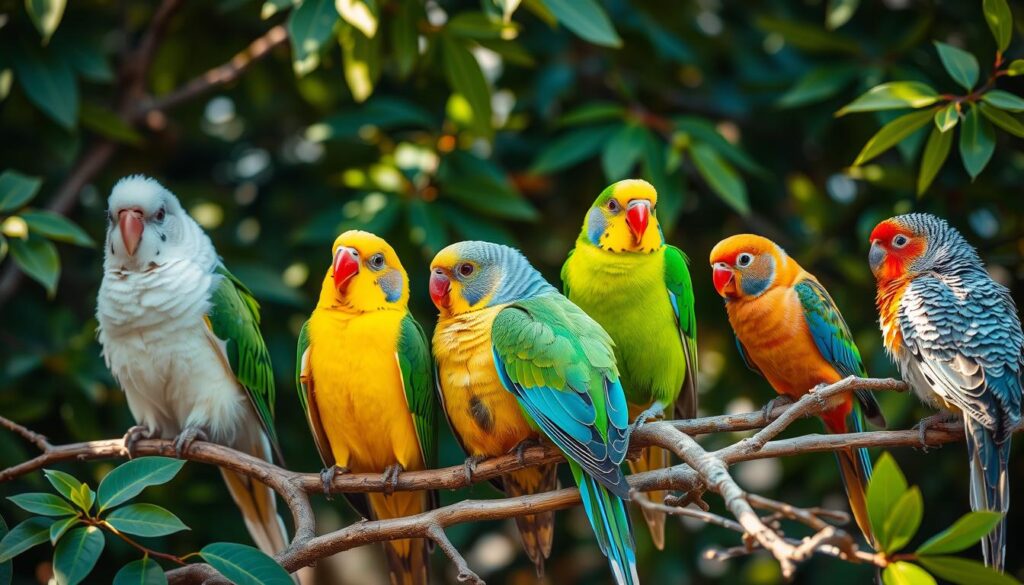
Medium-sized birds need more care and space but can be very rewarding. They are smart, lively, and can even talk. They can add a lot of fun and interaction to any home.
Large Parrots as Companion Birds
For those looking for a deep and lasting friendship, large parrots are a great choice. Birds like African Grey parrots, macaws, cockatoos, and Amazon parrots are smart and can live up to 50 years or more. This makes them a big responsibility.
African Grey Parrots
African Grey parrots are famous for their amazing talking skills. They are loyal and love to be around people. They need lots of attention and interaction to be happy.
Macaws and Cockatoos
Macaws, like the blue hyacinth macaw, and cockatoos, such as the sulphur-crested cockatoo, are stunning. But, they need a lot of space and a dedicated owner. They have big care needs.
Amazon Parrots
Amazon parrots, like the yellow-naped Amazon, are smart and fun. They can be loud and messy. They need a lot of time and money from their owners.
Having a large parrot is a big deal. They are needy, messy, and live a long time. They need a lot of time, attention, and money. They are only for the most dedicated owners.
Thinking carefully and doing research is key before getting a large parrot. They are smart, loyal, and fun. But, they need a lot of time, attention, and resources. Only those ready to give it can enjoy their company.
Essential Housing Requirements
Proper housing is key for pet birds. The size, design, and features of a bird’s enclosure greatly affect its well-being. Whether it’s a small finch or a large parrot, knowing the housing needs is vital.
The cage size is crucial. Small birds like Parrotlets, Finches, Lovebirds, Parakeets, and Canaries need cages with bars no wider than ½ inch and at least one square foot. Medium-sized birds, such as Cockatiels, Small Conures, and Quakers, require cages with bars no wider than ¾ inch and at least one and a half square feet. Larger birds, like Macaws, Cockatoos, Amazons, and African Grey Parrots, need cages with bars from ¾ inch to 1½ inch and at least one and a half times their wingspan in all directions.
The enclosure should also have various perches, toys, and enrichment to keep birds active and engaged. All birds need enough perch space: at least 4 inches for small birds, 12 inches for medium birds, and 24 inches for large birds. It’s important to watch for aggression signs when housing birds together. Make sure cages are far enough apart to prevent contact.
Good ventilation, temperature control, and protection from loud noises and predators are also vital. The housing should be weatherproof, clean, and encourage natural behaviors like bathing and nesting.
By following these bird cage requirements, aviary setup, and pet bird housing guidelines, you can give your bird a safe, enriching, and comfortable home.
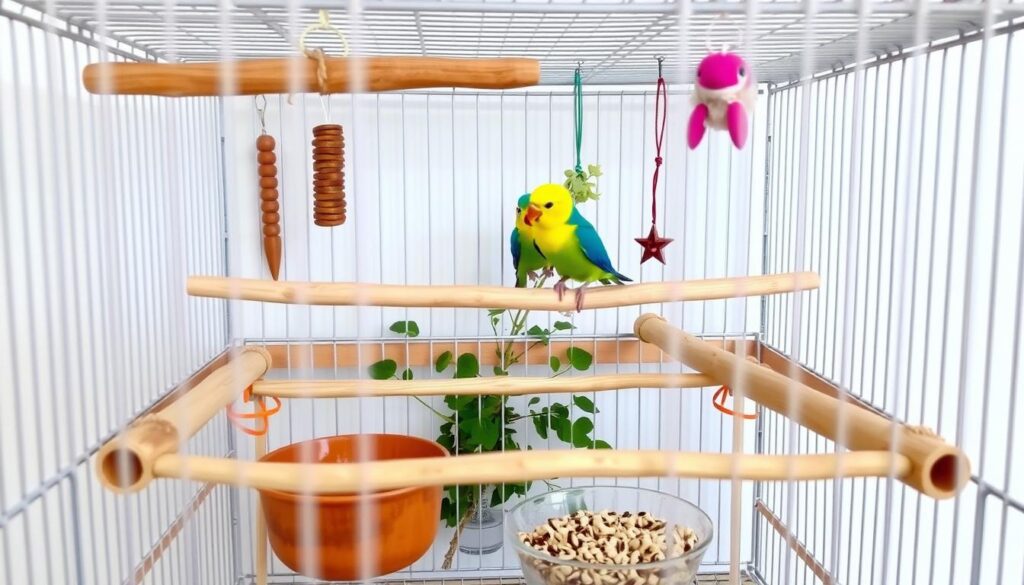
Diet and Nutrition Guidelines
It’s important to give your pet bird a balanced diet for their health. Seed-only diets are not enough for most birds. A good diet includes high-quality pellets, fresh fruits, vegetables, and treats now and then.
Balanced Diet Requirements
Pellets should be 60-80% of a bird’s diet because they are nutritious. Look for brands like Harrison’s, Kaytee (Exact), and Zupreem. Seeds should be a rare treat because they are high in fat and low in nutrients.
Fruits and vegetables like carrots, kale, and squash are great for your bird. They provide vitamins and minerals. But, avoid giving them avocado because it’s toxic.
Adding protein sources like eggs and tofu is also good. Birds on seed diets might need supplements to get all the nutrients they need.
Feeding Schedules and Tips
Small birds eat often because they have a fast metabolism. Larger birds might do better with a set meal time. Talk to an avian vet to figure out the best schedule for your bird.
For your bird’s health, a varied diet and the right amount of food are key. Following these tips will help your bird stay healthy and happy.
| Nutrient | Recommended Intake |
|---|---|
| Protein | 12-20% of diet |
| Fat | 3-7% of diet |
| Calcium | 0.6-1.2% of diet |
| Phosphorus | 0.5-0.8% of diet |
| Vitamin A | 5,000-10,000 IU/kg of diet |
“A balanced diet is the foundation of a healthy and happy pet bird. By providing a variety of nutritious foods, we can support our feathered friends’ overall well-being and ensure they thrive in captivity.”
A bird’s diet is key to their health. A good diet boosts their immune system and mental health. Always consult with an avian vet to find the best diet for your bird.
Health Care and Veterinary Needs
Keeping your pet bird healthy is very important. Regular avian veterinary care is key to keeping your bird happy and healthy. It’s crucial to find a avian veterinarian who knows about your bird’s species.
Watch for any changes in your bird’s behavior, appetite, or droppings. These can be signs of illness. Keeping their cage clean and living area clean helps prevent diseases. By paying attention to your bird’s needs and getting vet help when needed, you can keep them safe.
The American Veterinary Medical Association suggests taking your bird for a checkup every six to twelve months. These visits let your vet do a full check-up, address health issues, and give advice on avian veterinary care and food.
“Regular veterinary checkups are essential for maintaining the health and well-being of pet birds. An experienced avian veterinarian can help ensure your feathered friend receives the specialized care they need.”
By focusing on your bird’s health and working with a skilled avian veterinarian, you can help your bird live a long, happy life. They will be a cherished part of your family.
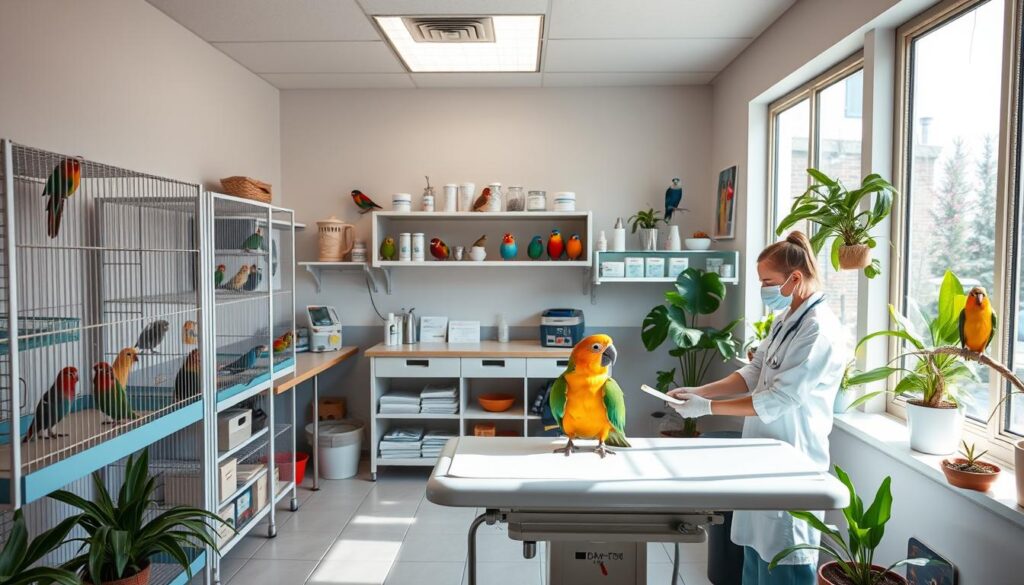
Training and Socialization Techniques
Training and socializing your pet bird is key for their happiness and your bond with them. Whether teaching them to talk or just basic behaviors, use positive methods. This makes learning fun for your bird.
Teaching Birds to Talk
Some birds, like African Greys and Amazon parrots, can learn many words. Start by saying simple words and phrases all day, with treats. Remember, it takes time and effort for birds to learn human speech.
Behavioral Training Methods
- Clicker training is great for teaching birds. It uses a device that makes a “click” sound to mark good behavior, then rewards it. This method is effective for shaping behaviors.
- Target training helps your bird touch a stick or your finger for treats. It encourages good behavior and builds positive associations.
- Step-up training teaches your bird to climb onto your hand or a perch. It’s good for handling and socializing, and makes vet visits easier.
Start socializing your bird early and keep it up. Introduce them to new people, places, and things in a positive way. This makes them more confident and less likely to be aggressive or fearful.
“Consistency and patience are key when training and socializing your pet bird. With time and positive reinforcement, you can build a strong, trusting bond that benefits both you and your feathered friend.”
Using thesebird training techniques,socializing pet birds, andteaching parrots to talk helps create a happy, well-adjusted bird. They will bring joy and enrichment to your life.
Legal Considerations and Regulations
As a pet bird lover, knowing the laws about owning birds is key. The rules for pet bird regulations, legal exotic pets, and avian ownership laws differ a lot. They vary by local, state, and federal laws.
It’s important to make sure your bird was legally bought and has the right papers. This is especially true for exotic or endangered birds. Some birds need special permits or have restrictions in certain places. Always check the laws in your area before getting a new bird.
Traveling with your bird within the country is usually easier than going abroad. You might need a vet’s health certificate for state travel. For international trips, you’ll need a CITES permit from the U.S. Fish and Wildlife Service. This can take up to a year.
Local laws and homeowner’s association rules might limit the number of pets, including birds. While you can usually have many indoor birds, outdoor aviaries might have specific rules.
Legal problems with pet birds can happen in many ways. This includes lawsuits over bites or noise complaints. Knowing your rights and duties as a bird owner helps you deal with these issues.
Staying up-to-date with pet bird regulations, legal exotic pets, and avian ownership laws is vital. This knowledge ensures a happy and legal experience with your bird.
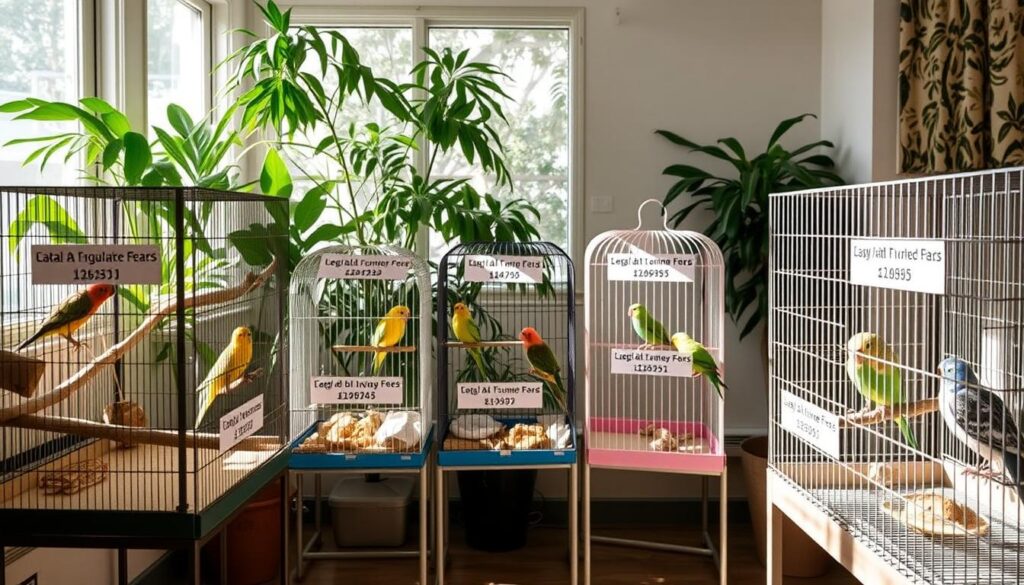
Choosing the Right Bird for Your Lifestyle
When picking a pet bird, think about your home, daily life, and future plans. Small birds like budgies or canaries fit well in apartments. But, big parrots like macaws and cockatoos need lots of space.
Some birds, like cockatiels, want lots of time with you. Others, like finches, are okay with less attention.
It’s important to match your lifestyle with the right bird. Some birds, like African Grey Parrots, can live up to 75 years. Budgies and cockatiels live 10-20 years. Big parrots can live 40-80 years. Make sure you can care for your bird for a long time.
Space Requirements
- Small birds like budgies and canaries do well in small homes.
- Medium birds, such as cockatiels and conures, need more room to fly and move.
- Big parrots, like macaws and cockatoos, need big cages and lots of floor space.
Time Commitment Factors
- Birds like cockatiels and Amazon Parrots need lots of time with you every day.
- Finches and canaries are more independent and need less attention.
- Training and socializing all birds is key for their happiness and yours.
Think about your home and life before choosing a bird. This way, you’ll find the perfect bird friend for your home and enjoy many happy years together.
Where to Acquire Your Pet Bird
Getting a pet bird is a big decision. It’s important to find a reliable source. Don’t buy birds without seeing them first or from unknown places. This can lead to health or behavior problems.
Here are some good ways to get a bird:
- Specialized Pet Bird Stores: Choose stores that care about their birds. They have staff who know a lot about birds and can help you choose the right one.
- Responsible Breeders: Look for breeders who care about their birds’ health and happiness. They can help you find a bird that is well-socialized and happy.
- Bird Adoption Organizations: Adopting from a shelter or rescue is a great option. They have birds looking for homes and can tell you about the bird’s background.
When you find a bird, make sure it looks healthy and fits your home. Watch how the bird acts and interact with it. This way, you can find the perfect bird for your family.
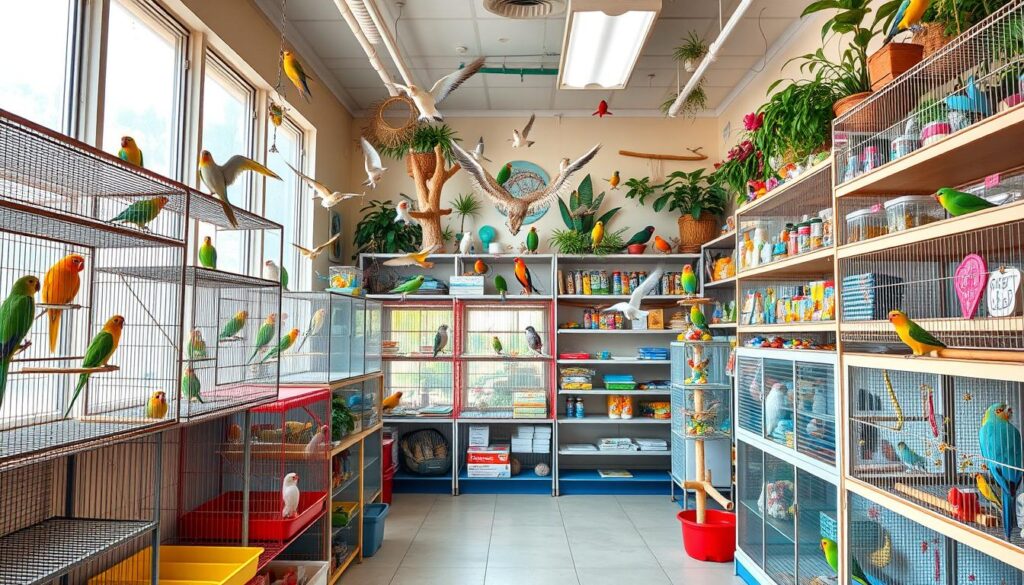
Conclusion
Owning a pet bird can be very rewarding. It requires a big commitment to the bird’s long-term well-being. Before getting a bird, research the species, their needs, and how they fit into your life.
By choosing the right bird for your lifestyle, you can give your feathered friend a loving home. The pet bird guide in this article covers many bird species. From small finches to large parrots, each has its own needs.
Responsible avian companion care is key for your bird’s health and happiness. Bird ownership is a long-term promise. It comes with both challenges and rewards.
This bird ownership summary is for both new and experienced bird owners. It offers insights to help you make a good choice. By caring for your bird ethically and sustainably, you’ll enjoy their unique companionship.
FAQ
What types of birds can be kept as pets?
A wide variety of birds can be pets. This includes parakeets, cockatiels, canaries, finches, lovebirds, conures, African Grey parrots, Amazon parrots, macaws, and cockatoos. Each bird has its own needs and is suited for different homes and owners.
What are the benefits of having a bird as a pet?
Birds are intelligent, beautiful, and can sing or talk. They can be friendly and live a long time. They need interaction, the right home, food, and vet care. But, they can be great pets for the right person.
What are the care requirements for different pet bird species?
The care needs vary by bird species. Smaller birds like budgies need less care. But, larger parrots like African Greys need a lot of space and attention. All birds need the right home, food, vet care, and social time.
What are some good beginner-friendly pet bird species?
Budgies, cockatiels, canaries, and finches are good for beginners. They are smaller and easier to care for than larger parrots.
What should I consider when choosing a pet bird?
Think about your lifestyle and space when choosing a bird. Smaller birds fit well in apartments, while larger ones need more room. Some birds need lots of interaction each day. Remember, many birds live a long time, so be ready for a big commitment.
What are the legal requirements for owning a pet bird?
Know the laws about owning pet birds in your area. Some birds need special permits. Make sure your bird is legal to own, especially if it’s exotic or endangered.
Where can I acquire a pet bird?
Get birds from trusted places like bird stores, breeders, or shelters. Avoid buying from unknown places. Make sure the bird looks healthy and is well-socialized before you take it home.
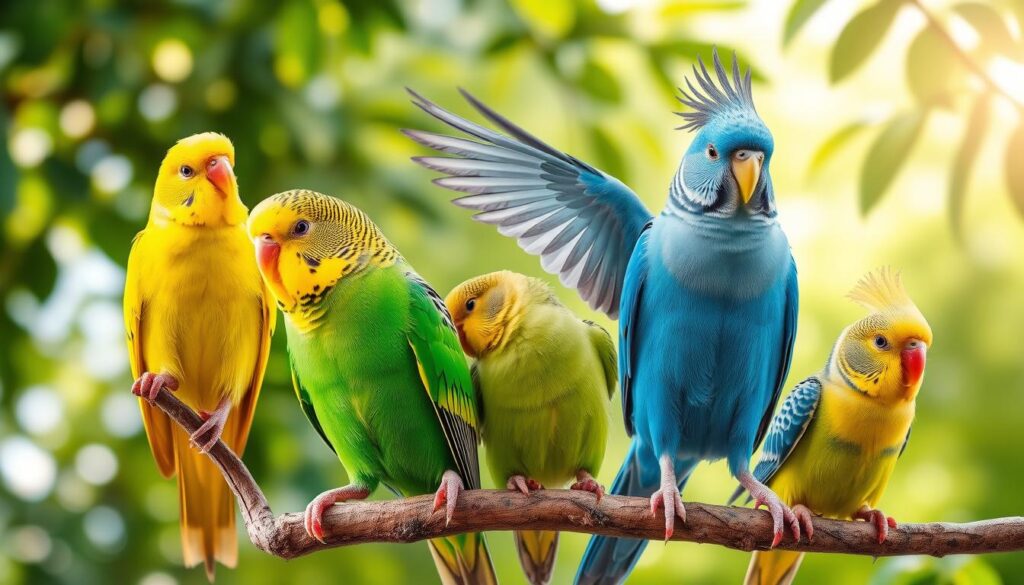

продажа аккаунтов площадка для продажи аккаунтов
аккаунты с балансом маркетплейс аккаунтов
безопасная сделка аккаунтов профиль с подписчиками
заработок на аккаунтах продажа аккаунтов
аккаунт для рекламы https://prodat-akkaunt-online.ru/
продажа аккаунтов https://kupit-akkaunt-top.ru/
маркетплейс аккаунтов соцсетей pokupka-akkauntov-online.ru/
Profitable Account Sales Sell Pre-made Account
Website for Buying Accounts Account Catalog
Secure Account Purchasing Platform Ready-Made Accounts for Sale
Account exchange Account Exchange Service
Account Sale Account marketplace
Marketplace for Ready-Made Accounts Secure Account Sales
Profitable Account Sales Find Accounts for Sale
Account Purchase Account Exchange Service
Account Selling Service accountsmarketplaceonline.com
Secure Account Purchasing Platform Gaming account marketplace
Online Account Store Account exchange
account sale sell accounts
account exchange account buying platform
buy pre-made account profitable account sales
website for buying accounts accounts market
website for selling accounts buy pre-made account
ready-made accounts for sale guaranteed accounts
account purchase accounts marketplace
account store account selling platform
account buying platform account purchase
account store account trading service
profitable account sales secure account sales
account exchange secure account purchasing platform
buy and sell accounts https://accounts-buy.org/
account trading secure account purchasing platform
gaming account marketplace sell account
sell account account selling service
online account store verified accounts for sale
secure account purchasing platform accounts marketplace
accounts market sell pre-made account
account buying service online account store
account catalog accounts marketplace
account marketplace account buying service
account exchange service account buying service
sell account account sale
account buying platform account acquisition
marketplace for ready-made accounts accounts marketplace
website for buying accounts account marketplace
account selling platform ready-made accounts for sale
account exchange https://accounts-offer.org
sell accounts https://accounts-marketplace.xyz
find accounts for sale https://buy-best-accounts.org
account market social-accounts-marketplaces.live
buy accounts https://accounts-marketplace.live/
accounts market accounts market
account buying service https://buy-accounts.space/
buy accounts accounts marketplace
account exchange service accounts marketplace
sell pre-made account https://social-accounts-marketplace.live
accounts marketplace https://buy-accounts.live
find accounts for sale https://accounts-marketplace.online
buy and sell accounts https://accounts-marketplace-best.pro
продажа аккаунтов https://akkaunty-na-prodazhu.pro
маркетплейс аккаунтов соцсетей https://rynok-akkauntov.top/
магазин аккаунтов https://kupit-akkaunt.xyz
продать аккаунт https://akkaunt-magazin.online/
маркетплейс аккаунтов https://akkaunty-market.live/
площадка для продажи аккаунтов kupit-akkaunty-market.xyz
биржа аккаунтов https://akkaunty-optom.live/
продать аккаунт online-akkaunty-magazin.xyz
биржа аккаунтов akkaunty-dlya-prodazhi.pro
биржа аккаунтов https://kupit-akkaunt.online
facebook ads account buy buy facebook ads account
buy facebook profiles https://buy-ad-accounts.click/
fb accounts for sale https://buy-ad-account.top
buy facebook ad accounts https://buy-ads-account.click
buy facebook profiles https://ad-account-buy.top
facebook ads accounts https://buy-ads-account.work
buy facebook accounts cheap facebook ad account buy
buy aged facebook ads accounts https://buy-ad-account.click
В этой информационной статье вы найдете интересное содержание, которое поможет вам расширить свои знания. Мы предлагаем увлекательный подход и уникальные взгляды на обсуждаемые темы, побуждая пользователей к активному мышлению и критическому анализу!
Углубиться в тему – https://medalkoblog.ru/
В этой статье-обзоре мы соберем актуальную информацию и интересные факты, которые освещают важные темы. Читатели смогут ознакомиться с различными мнениями и подходами, что позволит им расширить кругозор и глубже понять обсуждаемые вопросы.
Детальнее – https://medalkoblog.ru/
facebook account buy buy facebook old accounts
buy google ads threshold accounts buy google ads account
buy aged google ads accounts https://buy-ads-accounts.click
buy aged facebook ads accounts https://buy-accounts.click/
google ads agency accounts buy google adwords accounts
buy google adwords accounts https://ads-account-buy.work/
buy verified google ads accounts https://buy-ads-invoice-account.top
google ads accounts https://buy-account-ads.work
buy google agency account https://buy-ads-agency-account.top
buy aged google ads accounts google ads account buy